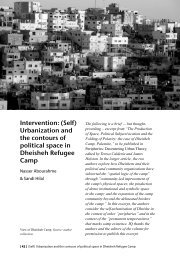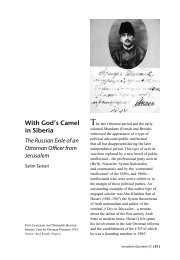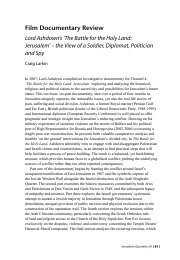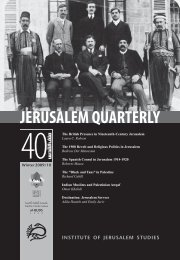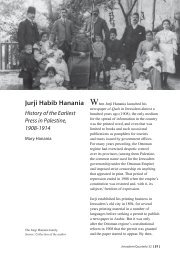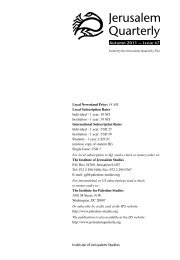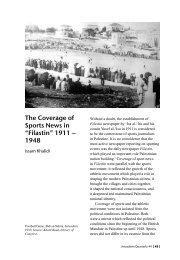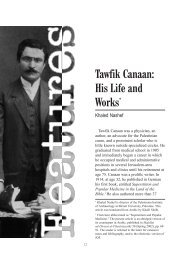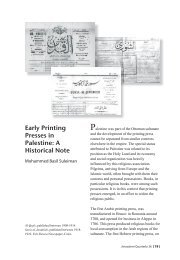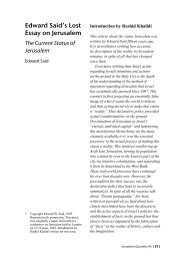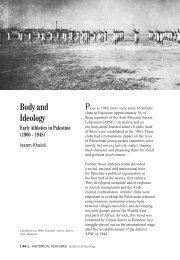PLUNDERING PALESTINE - Jerusalem Quarterly
PLUNDERING PALESTINE - Jerusalem Quarterly
PLUNDERING PALESTINE - Jerusalem Quarterly
You also want an ePaper? Increase the reach of your titles
YUMPU automatically turns print PDFs into web optimized ePapers that Google loves.
Chapter 4 Section 20<br />
Presumption of Knowledge<br />
20A: An antiquities dealer shall not acquire an antiquity except from one of<br />
the following: (1) An antiquities dealer; (2) A person who holds authorization<br />
from the Director in accordance with the regulations of paragraph 25,<br />
unless that person is not obliged to provide notification in accordance with<br />
the regulations of this law. 31<br />
This is meant to ensure that, unless traders who routinely supply the antiquities dealers<br />
in <strong>Jerusalem</strong>’s Old City are licensed dealers, their transactions are entirely illegal.<br />
Amendments were also made to the export of antiquities which theoretically close the<br />
loophole of exporting material from Palestine:<br />
Chapter 4 Section 20<br />
Restrictions on export of antiquities<br />
22A. (a) A person may not bring into Israel an antiquity from the region<br />
unless he has received approval to do so from the Director and in accordance<br />
with the conditions of the permission; this permit can be personal or<br />
general and only if the general permit is publicized in Reshumot 32 .<br />
(b) In this paragraph, “region” means each of the following: Judea and<br />
Samaria 33 and the Gaza Strip. 34<br />
And yet recent accounts detail the complex networks of trade involved in selling<br />
illegally-acquired items as legitimate artefacts in the legal marketplace. Artefacts<br />
routinely arrive from Palestine, Jordan, Israel and elsewhere, enter a process of<br />
laundering, and then are sold as ‘legally’ exported from licensed dealers in Israel. 35<br />
The Israeli legal venue that allows the sale of illegally-excavated artefacts provides<br />
an impetus for looting. Artefacts, many from the West Bank and Gaza, routinely make<br />
their way into the legitimate marketplace through a system of laundering and reuse of<br />
inventory numbers. Dealers are not required to provide export permits for the goods<br />
they sell; the onus is on the purchaser to request one and if none is requested then<br />
there is no real record of the sale (an export license is issued by the Israel Antiquities<br />
Authority after the item has been verified as part of a registered dealer’s inventory).<br />
The inventory number for the sold item can then be reassigned to a similar recentlylooted<br />
item, thus laundering the artefact. Palestine has not yet enacted heritage<br />
legislation prohibiting the movement of archaeological material across its borders, so<br />
artefacts are entering the legal market in Israel at an alarming rate. 36<br />
Palestinian Legislation<br />
Following the Palestinian-Israeli agreement in 1993, Jericho and the Gaza Strip were<br />
placed under the control of the Palestinian Authority (PA); subsequently in 1994 and<br />
[ 30 ] FEATURES The Trade in Palestinian Antiquities



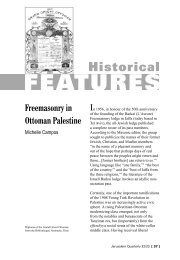
![In Search of Jerusalem Airport [pdf] - Jerusalem Quarterly](https://img.yumpu.com/49007736/1/180x260/in-search-of-jerusalem-airport-pdf-jerusalem-quarterly.jpg?quality=85)
